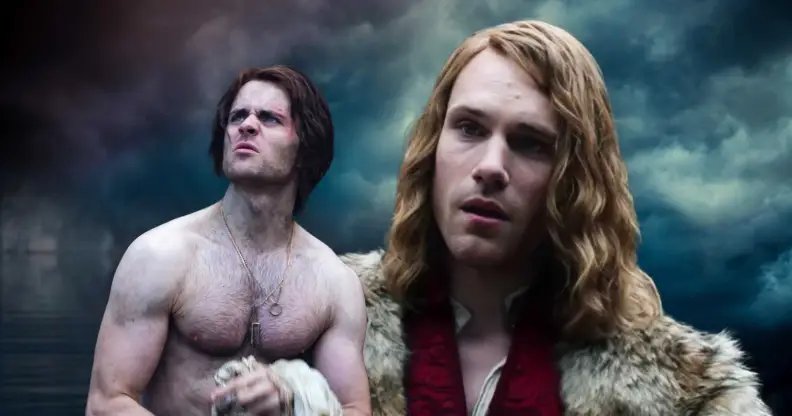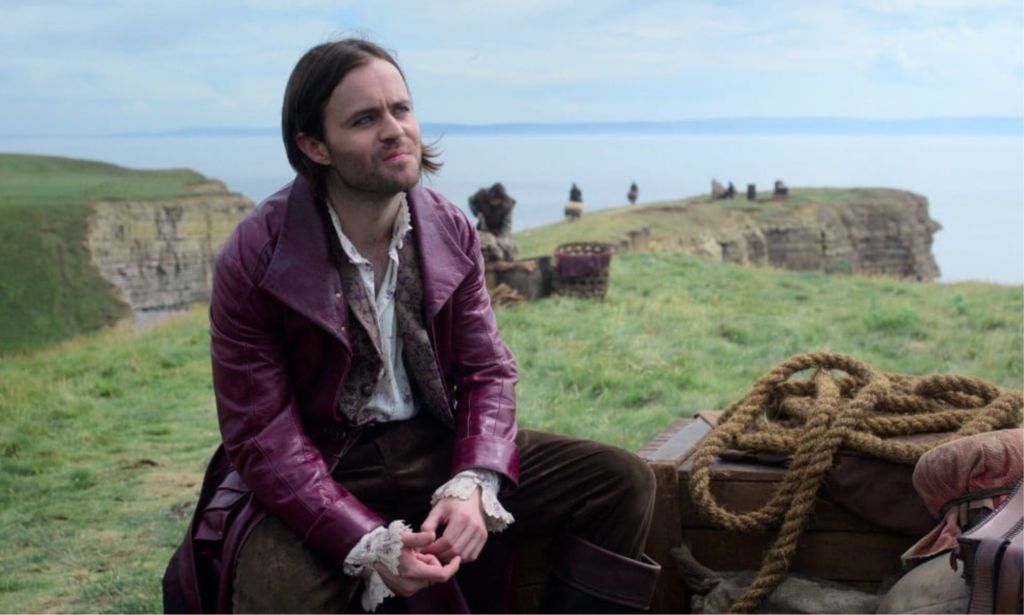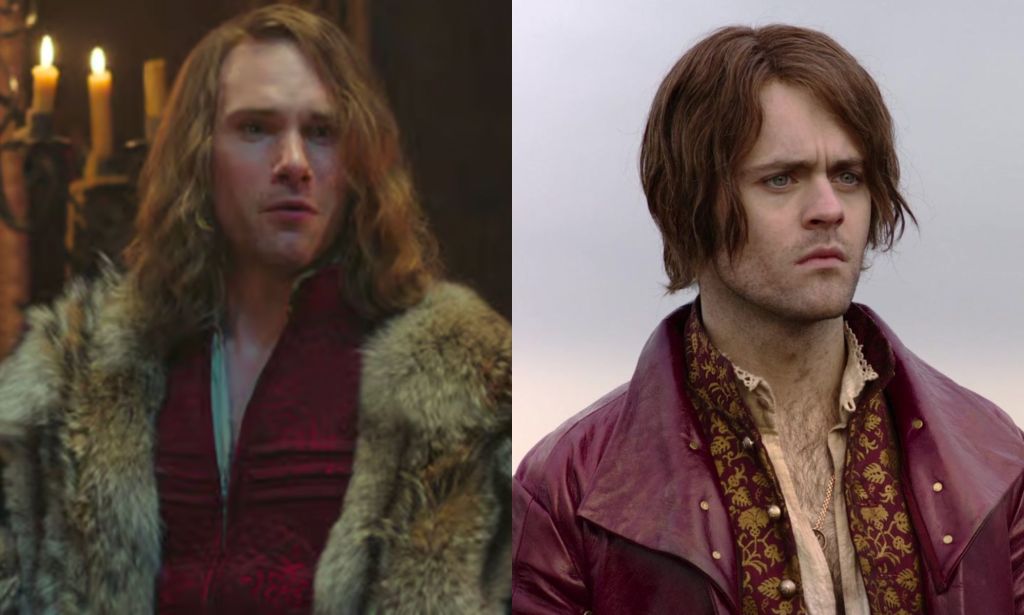The Witcher’s Joey Batey and Hugh Skinner discuss making Jaskier’s queer romance authentic

Jaskier and Prince Radovid are The Witcher’s first queer romance. (Netflix/PinkNews)
The Witcher stars Joey Batey and Hugh Skinner have discussed the intense process behind making Jaskier queer, how they avoided “bisexual erasure”, and the bard’s future with Prince Radovid.
Warning: Spoilers ahead.
Ever since Netflix’s prestige fantasy drama series The Witcher premiered back in 2019, its large and wildly opinionated fandom have been torn.
“Is Jaskier bisexual?,” one Reddit thread questions. “I think he’s bisexual on the show,” one fan suggests. “I think he is,” another adds. “NO,” shouts a third. “Stop making hetero characters homosexual, there is NO NEED.” Another chips in: “No, he’s totally heterosexual. No hints of him being in the closet at all.”
While there is no indication of travelling bard Jaskier swinging both ways in the The Witcher Saga books, penned by Polish author Andrzej Sapkowsk, it’s a different story in Netflix’s juggernaut adaptation.
Fans first got a feeling that Jaskier (played by British actor Joey Batey) was a little on the fruity side in season one, episode four, where he takes great pleasure in helping monster hunter and lead character Geralt (currently played by Henry Cavill, soon to be replaced by Liam Hemsworth), have a bath.
For nearly four years, the battle lines in the fandom have been drawn. Even critics have weighed in. “We need to talk about Jaskier,” wrote Digital Spy in 2021, calling out the show for “queerbaiting”. “Make Jaskier bisexual, you cowards,” demanded publication The Mary Sue in 2020.
Now, as the first part of season three drops, there is finally confirmation: yes, the beloved bard is a canon bisexual. Plus, he’s got a queer love interest in the former of newcomer Prince Radovid, played by Fleabag star Hugh Skinner.
“It’s something that I’ve been asking the writers about since season one, without any definitive answer, if I’m completely honest,” Batey tells PinkNews, adding that he “made a bunch of decisions for myself” about the character’s sexuality.
In their first on-screen appearance together in season three’s first episode, the chemistry between Batey and Skinner’s characters is immediately palpable, with Radovid’s eyes practically stripping Jaskier out of his tunic.
As the first explicitly queer romance in the show’s history, the scene matters. For Batey, it matters even more: it was the scene he had to act out for his audition, and a scene he’s been “begging” the writers to put to use ever since.
It was an “odd” experience for Batey, re-filming the moment that got him the part almost five years ago. But thanks to the work of Lauren Schmidt-Hissrich, the show’s writer, the chemistry flowed off the script pages.
“It was all in the writing, to be honest,” Skinner says. “I really enjoyed working with Joey. We had a chemistry read and stuff. I think Radovid is so bored and aimless and drunk [and is] so excited to meet Jaskier and captivated by him. It was a fun scene to play.”
While it was Schmidt-Hissrich’s idea to finally give Jaskier a male love interest, both Batey and Skinner were given the opportunity to provide feedback on how it was executed.
“I was very insistent that it was done in a way that was sensitive, that was not in any way kind of representative of bisexual erasure, and done in as romantically as any of the other romantic stories in the cannon,” Batey explains.
It’s unsurprising that Batey wanted to do it right. Some of the world’s most successful shows, even those that have found mass popularity with an LGBTQ+ audience, have a sketchy history of poor treatment of bisexual characters.
Everyone remembers that infamous Sex and the City scene where Carrie Bradshaw declares she’s “not even sure bisexuality exists” as it’s “just a layover on the way to Gay Town”. Lest we forget Desperate Housewives’ Katherine Mayfair randomly forgetting her bisexuality in season eight.
How hard did Batey have to fight for Jaskier’s sexuality to be done right? “I think I, at one point, sent a small dissertation that came to about 7000 words, ripping apart every single bit of the first few drafts,” he admits.

It took a lot of time, and a lot of emails. “[I was] really questioning why, and questioning how, and questioning the manner in which we could present this in as truthful and romantic a way as possible.”
Preventing Jaskier from becoming a stereotype was also personal for Batey: after filming wraps, it takes at least “a good month” for Jaskier to leave his head. He has an intense connection with the character, whom he will undoubtedly be associated with long after the series ends.
In the end, he and Schmidt-Hissrich worked it out. “She was so very open and collaborative, and ready to explore not only the Jaskier that she’s written on the page, but my version of Jaskier, who’s been pretty much living inside me for now four years.”
Naturally, the fans have – and will continue to have – thoughts about Jaskier’s queerness. One corner of the fandom will mourn the potential loss of Geraskier – the ship name for Jaskier and Geralt.
As Radovid, the new arrival, did Skinner know quite how possessive the fans were over the character arcs? “I became aware,” he says, knowingly. “I became aware when they announced all the new people that were joining the series and saw the amount of – you shouldn’t look, should you – but I saw the amount of traction it got online. And then I was like, ‘Oh my God, please don’t be sh*t’.”
As someone who had only seen bits of the show before auditioning, he was “scared” and “intimidated”, but watching fan thoughts unfold was how he prepped, by “disturbing myself to try not to be cr*p”.
In terms of how the audience responds to the relationship, Skinner simply says he “hopes they get on board”. Similarly, Batey doesn’t care too much about how the fandom responds; he just hopes they appreciate the work that went into creating the series.

“Season three was a very challenging shoot for various different reasons,” he reveals. “It was just long and gruelling, and it took a lot out of all of us. Everyone is entitled to hate, to love it. That’s the point of fandoms, and that’s the point of enjoying entertainment,” he says.
“But ultimately, at the end of the day, as long as it is healthy and respectful dialogue, then I’m all for it.”
Regardless of whether the fandom is content with Jaskier’s queerness or his relationship with Prince Radovid, there is no denying that it matters. While LGBTQ+ representation is on the uptick, the fantasy genre falls behind – particularly in series inspired by the mediaeval. It’s telling enough that Jaskier and Radovid mark The Witcher’s first LGBTQ+ relationship.
“To me, it was so exciting that a storyline like this was on a show of this magnitude, and of this tone as well and genre,” Skinner rounds off. “Because that felt like quite a unique thing.”
While Jaskier will be unlikely to lead the Continent’s first ever Pride march, it’s thrilling that the character’s world has opened up a little more. As to whether he and Radovid will be in it for the long haul together, Batey can’t say.
“I think the safest way to put this is that there is a deep connection between them,” he teases, “but there are many political machinations at play that are pulling them apart”.
He’s vague about how the relationship will transpire, but crystal clear about how he feels about Jaskier’s queer journey in general.
“It was a bit of a joy, actually, to be presented with this and to be involved in its creation,” he concludes.
“It certainly has been a little unspoken. And I’m now very, very happy that it is spoken.”
The Witcher season three is streaming on Netflix now.
How did this story make you feel?

